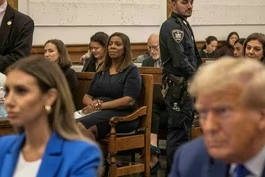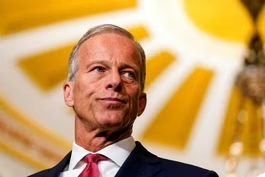
Leiter: 'Hamas cannot remain' in Gaza for this plan to work
Clip: 10/9/2025 | 7m 48sVideo has Closed Captions
'Hamas cannot remain' in Gaza for this plan to work, Israeli ambassador to U.S. says
As Israel and Hamas work to implement the first phase of the ceasefire deal, Geoff Bennett spoke with Israel's ambassador to the U.S., Yechiel Leiter, about what changed to make this agreement acceptable today when it wasn’t previously.
Problems playing video? | Closed Captioning Feedback
Problems playing video? | Closed Captioning Feedback
Major corporate funding for the PBS News Hour is provided by BDO, BNSF, Consumer Cellular, American Cruise Lines, and Raymond James. Funding for the PBS NewsHour Weekend is provided by...

Leiter: 'Hamas cannot remain' in Gaza for this plan to work
Clip: 10/9/2025 | 7m 48sVideo has Closed Captions
As Israel and Hamas work to implement the first phase of the ceasefire deal, Geoff Bennett spoke with Israel's ambassador to the U.S., Yechiel Leiter, about what changed to make this agreement acceptable today when it wasn’t previously.
Problems playing video? | Closed Captioning Feedback
How to Watch PBS News Hour
PBS News Hour is available to stream on pbs.org and the free PBS App, available on iPhone, Apple TV, Android TV, Android smartphones, Amazon Fire TV, Amazon Fire Tablet, Roku, Samsung Smart TV, and Vizio.
Providing Support for PBS.org
Learn Moreabout PBS online sponsorshipGEOFF BENNETT: And, as Nick mentioned, we spoke earlier today with Israel's ambassador to the U.S., Yechiel or Michael Leiter.
And I asked him, why now?
What changed politically, militarily or diplomatically to make this agreement acceptable today, when it wasn't previously?
YECHIEL LEITER, Israeli Ambassador to the United States: The answer is pretty simple.
There are a number of vectors that actually came together.
And this happens during the course of history, where something wasn't workable and suddenly it becomes workable.
The first thing is that the president, President Trump, decided to really turn to the Arab countries and Turkey and tell them, look, you have got Hamas leadership sitting in your countries.
You have got to turn the screws on them.
And you have got to tell them that either they take this deal and let the hostages out, or I'm going to give full backing to the Israelis to militarily decide the fate of the leadership in -- both in Gaza and outside of Gaza.
So that's the one vector.
The other vector, of course, is alongside of, that our military, the IDF, has surrounded Gaza City, the last stronghold of Hamas.
Most of their leadership has been eliminated.
And we made it very clear that, if they don't move to agree to release the hostages, we're going to move militarily into the city and destroy their last stronghold.
So these two vectors came together.
And, ultimately, the Arab states, together with Turkey, brought Hamas to its knees and to agree basically to this agreement, which is a defeat of Hamas, is what we pursued from the very beginning.
GEOFF BENNETT: Taking your explanation of these vectors, as you describe them, given the immense human toll over the past two years, how does Israel respond to those who say that this outcome could and should have been achieved much sooner?
YECHIEL LEITER: Well, if it could have been achieved sooner, it would have been achieved sooner.
The problem is that certain people, both in the political world and in the world of media, create narratives, and then they pass commentary on the narratives.
The only problem is, the narrative isn't true.
The government of Israel, prime minister of Israel was intent on ending this war.
He made the aims very clear.
The hostages have to be released, Hamas has to be disarmed and Gaza has to be demilitarized.
Those were the conditions.
And the conditions were not met until now, until the president picked up the ball and took it to the states that were mediating.
That's Qatar, Turkey and Egypt.
Saudi Arabia too deserves some credit.
And told them, look, we have got to end this thing, end it now.
You have influence over Hamas.
Bring that influence to bear.
And the prime minister's parameters for ending the war were met.
Until now, it simply wasn't possible.
GEOFF BENNETT: When the hostages are returned, if Hamas stages a public display, if they exploit them in any way, as that terrorist group has done in the past, would Israel see that as a violation of the cease-fire terms?
YECHIEL LEITER: We expect that Hamas will try to violate the terms.
We don't know exactly how.
But once all the hostages are released, we have got to go into the second phase and the third phase, which is the de-radicalization and the disarming of Hamas.
And it's going to be a bumpy ride.
There's no question about that.
But we're going to be as patient as we can and hope that it's going to be implemented as the president has promised.
We have to see the creation of this international body that the president has taken upon himself to lead.
And if he's at the head of it, it's quite possible that we're going to see the end of Hamas rule in Gaza and a civilian population rise to a state of affairs where they're living in freedom and pose never again a threat on the people of Israel.
That's really what we want to achieve.
We cannot have jihadis living at our border again.
And once that's in place, the people of Gaza and the people of Israel will live side by side in peace.
GEOFF BENNETT: Hamas is demanding the release of Marwan Barghouti, a figure many Palestinians regard as their most legitimate national leader, one that Israel views as a terrorist.
And we should explain he was jailed for planning attacks during the second Palestinian intifada, which he denies.
Would Israel ever agree to his release, or is that a red line?
YECHIEL LEITER: Marwan Barghouti is a red line.
He can deny anything he wants.
He was found guilty in a court of law for at least five murders.
And those were the ones that we documented and proved.
There are others, many others, that he's responsible for.
He was the head of the Tanzim.
And the Tanzim was the Fatah hench-squad that killed people, many people.
So he's responsible indirectly for many murders, directly for five, for which he's sitting in jail for life.
GEOFF BENNETT: You mentioned earlier you see this deal as leading toward the destruction of Hamas.
Tell me more about that, because Hamas has not agreed to disarm.
They have not agreed to leave Gaza, as Israel has insisted in the past.
YECHIEL LEITER: The agreement, the 20-point plan, is very clear on the disarming of Hamas.
And it's also very clear that if they do not disarm, then we're going to go back into military confrontation.
They have to disarm.
Hamas cannot remain standing in Gaza.
That's the plan and that's what has to be implemented.
This plan is basically ensconced with the government's directives for completing this war.
And that's the disarming of Hamas and the demilitarization of Gaza.
If that doesn't happen, then this peace plan is not going anywhere.
And if they don't do it willingly, then this international agency that's being created has to do it.
And if the international agency doesn't do it, Israel's going to have to do it.
GEOFF BENNETT: May I ask you, as someone who has experienced profound personal loss connected to this war -- you lost your son in combat in Gaza in November of 2023 -- how does this moment resonate with you on a personal level?
YECHIEL LEITER: Well, I miss my son more than I can describe.
He was my oldest son.
He was my best friend.
He was so alive and connected to life.
He left me six grandchildren, but he's not coming back.
And the only thing that I have is to live what he lived for.
And he gave his life for the safety and security of the state of Israel and the Jewish people.
And I carry him forward.
And I'm going to find some consolation when the hostages come home and I see the parents embrace their children once again, these children who have been kept in dungeons underground for two years.
When I see that embrace, I'm going to feel a sense of consolation.
And if I experience soon the end of -- really the end of this war and the end of the confrontation with both Palestinian extremism, with this Islamism that really wants to destroy us -- they say openly, just to destroy Israel.
So when I see that subside and I see moderation rise to the surface, I see Gaza begin to be rebuilt, where people can raise their human development index and live side by side together with us.
I will find consolation in that.
GEOFF BENNETT: Israeli Ambassador Michael Leiter, thanks again for your time.
We appreciate it.
YECHIEL LEITER: Thank you, Geoff.
Good to be with you.
Collection of Virginia Woolf's lost stories published
Video has Closed Captions
Clip: 10/9/2025 | 5m 37s | Collection of Virginia Woolf's lost stories published nearly 80 years after her death (5m 37s)
Gazans and Israelis celebrate ceasefire deal
Video has Closed Captions
Clip: 10/9/2025 | 7m 36s | Gazans and Israelis celebrate ceasefire deal with hopes for lasting peace (7m 36s)
ICE escalates aggressive raids in Chicago
Video has Closed Captions
Clip: 10/9/2025 | 7m 25s | ICE escalates aggressive raids in Chicago as Trump moves to deploy National Guard (7m 25s)
Letitia James indicted after pressure from Trump
Video has Closed Captions
Clip: 10/9/2025 | 3m 19s | N.Y. Attorney General Letitia James indicted on fraud charge after pressure from Trump (3m 19s)
Mideast expert analyzes Gaza peace deal and what comes next
Video has Closed Captions
Clip: 10/9/2025 | 6m 50s | Mideast expert analyzes Gaza peace deal and what comes next for the region (6m 50s)
News Wrap: Colombian president accuses U.S. of aggression
Video has Closed Captions
Clip: 10/9/2025 | 3m 29s | News Wrap: Colombian president accuses U.S. of 'military aggression' in Caribbean (3m 29s)
Thune says vote on subsidies possible after government opens
Video has Closed Captions
Clip: 10/9/2025 | 9m 51s | Thune says vote on health care subsidies possible, but only after government reopens (9m 51s)
Providing Support for PBS.org
Learn Moreabout PBS online sponsorship
- News and Public Affairs

FRONTLINE is investigative journalism that questions, explains and changes our world.

- News and Public Affairs

Amanpour and Company features conversations with leaders and decision makers.












Support for PBS provided by:
Major corporate funding for the PBS News Hour is provided by BDO, BNSF, Consumer Cellular, American Cruise Lines, and Raymond James. Funding for the PBS NewsHour Weekend is provided by...






